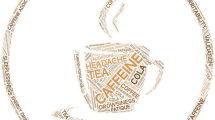Abstract
Caffeine is the most widely used psychoactive drug in the world. Expectancies for drug effects play a central role not only for drug initiation, use, cessation, and relapse, but also influence actual drug effects. In order to investigate caffeine expectancies and thereby increase knowledge and understanding of this legal drug, but also of substance use in general, an empirically sound research instrument is needed. In this study the English version of the ”Caffeine Expectancy Questionnaire (CaffEQ)” was translated and validated. The questionnaire consists of 47 items assessing expectancies of the psychological and physical effects of caffeine. The original version was translated thoroughly into German. The German CaffEQ was administered to a sample of N = 352 participants along with other relevant measures of interest. Psychometric properties could mostly be replicated. An exploratory factor analysis confirmed the seven factor solution and appropriate internal consistency was achieved. Convergent validity revealed high correlations with average daily caffeine consumption and symptoms of caffeine use disorder. By confirming validity and reliability of the German CaffEQ version a useful instrument is now available for assessment of caffeine expectancies of adults and its influence on the development of caffeine use disorder.
Similar content being viewed by others
References
Addicott, M. A. (2014). Caffeine Use Disorder: A Review of the Evidence and Future Implications. Current Addiction Reports, 1(3), 186–192.
American Psychiatric Association (2013). Diagnostic and statistical manual of mental disorders (5te ed., ). Arlington, VA: American Psychiatric Publishing.
Belles, S., Budde, A., Moesgen, D., & Klein, M. (2011). Parental problem drinking predicts implicit alcohol expectancy in adolescents and young adults. Addictive Behaviors, 36(11), 1091–1094.
Budney, A. J., Brown, P. C., Griffiths, R. R., Hughes, J. R., & Juliano, L. M. (2013). Caffeine withdrawal and dependence: a convenience survey among addiction professionals. Journal of Caffeine Research, 3(2), 67–71.
Dilling, H., Mombour, W., & Schmidt, M. H. (2010). Internationale Klassifikation psychischer Störungen. Bern: Hans Huber.
Dürr, I., & Stahlhut, H. (2013). Kaffee. Wirkungen auf die Gesundheit. Marburg: Deutsches Grünes Kreuz e.V.
Ganio, M. S., Klau, J. F., Casa, D. J., Asmtrong, L. E., & Marech, C. M. (2009). Effects of caffeine on sport-specific endurance perfomance: A systematic review. Journal of Strength and Conditioning Research, 23(1), 315–324.
Heinz, A. J., Kassel, J. D., & Smith, E. V. (2009). Caffeine Expectancy: Instrument Development in the Rasch Measurment Framework. Psychology of Addictive Behaviors, 23(3), 500–511.
Huntley, E. D., & Juliano, L. M. (2012). Caffeine Expectancy Questionnaire (CaffEQ): Construction, Psychometric Properties, and Associations WIth Caffeine Use, Caffeine Dependence and Other Related Variables. Psychological Assessment, 24(3), 592–607.
Jähne, A., Unbehaun, T., & Riemann, D. (2013). Der Zusammenhang zwischen Sucht und Schlaf: "legale" Drogen. Sucht, 59(1), 25–37.
James, J. E. (2012). Death by Caffeine: How Many Caffeine-Related Fatalities and Near-Misses Must There be Before we Regulate? Journal of Caffeine Research, 2(4), 149–152.
Juliano, L. M., Anderson, B. A., & Griffiths, R. R. (2011). Caffeine. In J. H. Lowinson, P. Ruiz, R. B. Millman, & J. G. Langrod (Eds.), Substance abuse: A comprehensive textbook (pp. 335–353). Baltimore, MD: Lippincott, Williams, & Wilkins.
Juliano, L. M., Huntley, E. D., Harrell, P. T., & Westermann, A. T. (2012). Development of the Caffeine Withdrawal Symptom Questionnaire. Drug and Alcohol Dependence, 124(39), 229–234.
Knapp, H., & Kirk, S. A. (2003). Using pencil and paper, Internet and touch-tone phones for self-administered surveys: does methodology matter? Computers in Human Behavior, 19(1), 117–134.
Lachenmeier, D. W., Wegert, K., Kuballa, T., Schneider, R., Ruge, W., Reusch, H., et al. (2013). Caffeine Intake from Beverages in German Children, Adolescents, and Adults. Journal of Caffeine Research, 3(1), 47–53.
Meredith, S. E., Juliano, L. M., Hughes, J. R., & Griffiths, R. R. (2013). Caffeine Use Disorder: A Comprehensive Review and Research Agenda. Journal of Caffeine Research, 3(3), 114–130.
Page, R., & Goldberg, R. (1986). Practices and attitudes toward caffeinated and non-caffeinated beverages. Health Education, 17(5), 17–21.
Reich, R. R., Below, M. C., & Goldman, M. S. (2011). Explicit and Implicit Measures of Expectancy and Related Alcohol Cognitions: A Meta-Analytic comparison. Psychology of Addictive Behaviors, 24(1), 13–25.
Rogers, P. J., Heatherley, S. V., Mullings, E. L., & Smith, J. E. (2013). Faster but not smarter: effects of caffeine and caffeine withdrawal on alerteness and performance. Psychopharmacology, 226(2), 229–240.
Snel, J., & Lorist, M. M. (2011). Effects of caffeine on sleep and cognition. Progress in Brain Research, 190, 105–117.
Striley, C. L., Griffiths, R. R., & Cottler, L. B. (2011). Evaluating Dependence Criteria for Caffeine. Journal of Caffeine Research, 1(4), 219–225.
Vilarim, M. M., Rocha Arajo, D. M., & Nardi, A. E. (2011). Caffeine challenge test and panic disorder: a systematic literatur review. Expert Reviews Neurotherapy, 11(8), 1185–1195.
Young, R. M., Connor, J. P., Ricciardelli, L. A., & Saunders, J. B. (2006). The role of alcohol expectancy and drinking refusal self-efficacy beliefs in university student drinking. Alcohol and Alcoholism, 41(1), 70–75.
Zamboanga, B. L., Ham, L. S., Van Tyne, K., & Pone, N. (2011). Alcohol expectancies among adolescent nondrinkers: They may not be drinking now, but they're "thinkin bout it". Journal of Adolescent Health, 49(1), 105–107.
Author information
Authors and Affiliations
Corresponding author
Ethics declarations
Conflict of Interest
Author M. Schott, Author W. Beiglböck and Author R. Neuendorff declare that they have no conflict of interest.
Informed Consent
All procedures followed were in accordance with the ethical standards of the responsible committee on human experimentation (institutional and national) and with the Helsinki Declaration of 1975, as revised in 2000 (5). Informed consent was obtained from all patients for being included in the study.
Rights and permissions
About this article
Cite this article
Schott, M., Beiglböck, W. & Neuendorff, R. Translation and Validation of the Caffeine Expectancy Questionnaire (CaffEQ). Int J Ment Health Addiction 14, 514–525 (2016). https://doi.org/10.1007/s11469-015-9606-6
Published:
Issue Date:
DOI: https://doi.org/10.1007/s11469-015-9606-6




